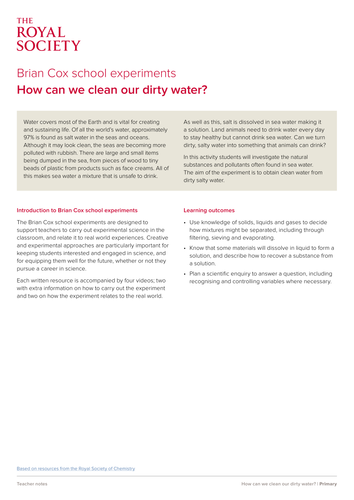





The Brian Cox school experiments are designed to support primary teachers to carry out experimental science in the classroom, and relate it to real world experiences. Each written resource is accompanied by four videos; two with extra information on how to carry out the experiment and two on how the experiment relates to the real world. These create a flexible package for teachers, with something for everyone.
Water is essential for life and the human body is around 60% water. We get most of our water from drinking it from taps or bottles and that water comes from reservoirs that are fed by rainfall, rivers and other sources. However there are many sources of water in nature that can be dangerous if we drink them, including the sea. Getting drinking water from these sources could prevent serious water shortages in some parts of the world.
In this experiment, students are given a water mixture including stones, sand and salt and are asked to separate it to get pure water. They can sieve, filter and evaporate the water.
Real world video: Brian Cox visits Mogden sewage plant to find out how sewage is cleaned before it returns to our rivers.
Research science video: Danielle from King's College London explains how they use a form of separation called chromatography to ensure athlete's are not using banned substances.
Water is essential for life and the human body is around 60% water. We get most of our water from drinking it from taps or bottles and that water comes from reservoirs that are fed by rainfall, rivers and other sources. However there are many sources of water in nature that can be dangerous if we drink them, including the sea. Getting drinking water from these sources could prevent serious water shortages in some parts of the world.
In this experiment, students are given a water mixture including stones, sand and salt and are asked to separate it to get pure water. They can sieve, filter and evaporate the water.
Real world video: Brian Cox visits Mogden sewage plant to find out how sewage is cleaned before it returns to our rivers.
Research science video: Danielle from King's College London explains how they use a form of separation called chromatography to ensure athlete's are not using banned substances.
Something went wrong, please try again later.
Very helpful
Report this resourceto let us know if it violates our terms and conditions.
Our customer service team will review your report and will be in touch.
£0.00